#Universal principles
Text
Delving into Poetic Wisdom: A Review of "On the Art of Poetry" by Aristotle
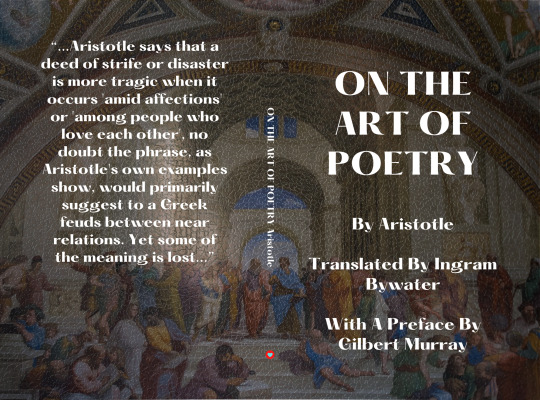
Aristotle's "On the Art of Poetry," translated by Ingram Bywater, stands as a seminal work in literary criticism, offering profound insights into the nature and function of poetry that continue to resonate with readers and scholars alike. Written in the 4th century BCE, this treatise serves as a comprehensive examination of the principles and techniques that underlie the creation of poetry, providing valuable guidance for poets and readers alike.
At its core, "On the Art of Poetry" is a testament to Aristotle's keen intellect and analytical prowess. In this work, Aristotle explores the various elements that contribute to the effectiveness of poetry, including plot, character, diction, and spectacle. Through his systematic analysis, Aristotle seeks to uncover the universal principles that govern the art of poetry, shedding light on its essential nature and its role in human society.
One of the most compelling aspects of "On the Art of Poetry" is Aristotle's emphasis on the importance of mimesis, or imitation, in poetry. According to Aristotle, poetry is a form of imitation that seeks to represent the actions, emotions, and experiences of human life. Through the skillful use of language and imagery, poets are able to create a vivid and lifelike portrayal of the world, inviting readers to engage with their work on a profound emotional and intellectual level.
Moreover, "On the Art of Poetry" offers valuable insights into the principles of dramatic structure and the role of catharsis in tragedy. Aristotle argues that tragedy is a form of poetry that evokes feelings of pity and fear in the audience, leading to a purgation or cleansing of these emotions. Through the depiction of the fall of a tragic hero, tragedy allows audiences to confront their own mortality and the fragility of human existence, ultimately leading to a deeper understanding of the human condition.
In addition to its exploration of tragedy, "On the Art of Poetry" also examines the principles of comedy and epic poetry, providing valuable guidance for poets working in these genres. Aristotle discusses the importance of unity of plot, character, and theme in epic poetry, as well as the role of humor and satire in comedy. Through his analysis, Aristotle highlights the diversity of poetic forms and the unique challenges and opportunities that each genre presents to the poet.
In conclusion, "On the Art of Poetry" by Aristotle is a timeless classic that continues to inspire and enlighten readers with its profound insights into the nature of poetry. Aristotle's systematic approach to literary criticism, coupled with his keen observations and analytical rigor, make this work an indispensable resource for anyone interested in the art of poetry. With its timeless wisdom and enduring relevance, "On the Art of Poetry" remains a cornerstone of literary theory and a testament to the enduring power of poetic expression.
Aristotle's "On the Art of Poetry," is available in Amazon in paperback 12.99$ and hardcover 18.99$ editions.
Number of pages: 116
Language: English
Rating: 10/10
Link of the book!
Review By: King's Cat
#Aristotle#Poetry#Literary criticism#Mimesis#Imitation#Dramatic structure#Tragedy#Catharsis#Comedy#Epic poetry#Unity of plot#Characterization#Diction#Spectacle#Poetics#Aesthetic principles#Greek literature#Philosophical discourse#Aristotle's theory#Literary analysis#Poetic form#Emotion#Human experience#Morality#Ethics#Aesthetics#Universal principles#Literary genres#Rhetoric#Imagination
2 notes
·
View notes
Text
Another way to Create Your Reality
One of the definitions for the word: “Realization” is, “the fulfillment or achievement of something desired or anticipated”. This was a word that took a little time for me to reclassify within my vocabulary while I was pursuing my degree in mysticism. It makes so much sense though, to realize is to literally make something “real”, at least in the sense of the word as we understand it. It’s to…
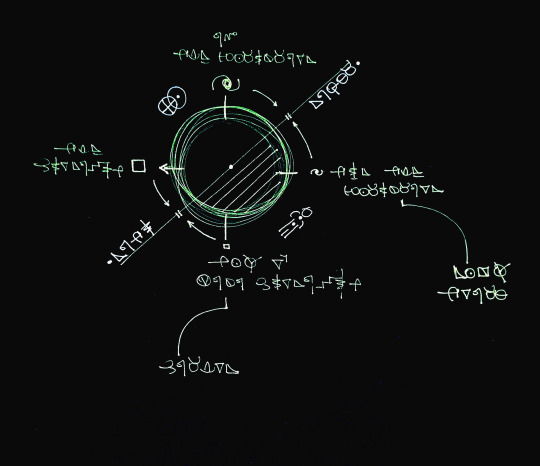
View On WordPress
#Ancient Practices#Antisuyu Revelation#Cardinal Directions#Chinchisuyu Creation#Cultural Variations#Emotional Blockages#Emotional States#Energy Dynamics#Goal Setting#Inka Empire#Kollasuyu Awakening#Kontisuyu Resetting#Lifestyle Impact#Medicine Wheel#Mental Traps#Mystical Characteristics#Mysticism#Number Four Symbolism#Personal Growth#Physical Reality#Realization#Self-evolution#Shamanic Initiation#shamanic practices#Spiritual Awakening#Spiritual Tools#Tawantinsuyu#Transpersonal Integration#Universal Principles
0 notes
Text
Delving into Poetic Wisdom: A Review of "On the Art of Poetry" by Aristotle
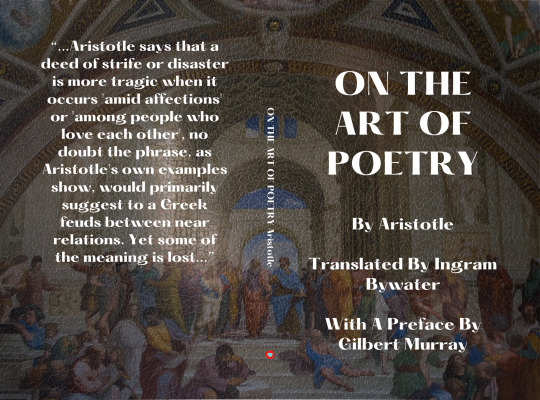
Aristotle's "On the Art of Poetry," translated by Ingram Bywater, stands as a seminal work in literary criticism, offering profound insights into the nature and function of poetry that continue to resonate with readers and scholars alike. Written in the 4th century BCE, this treatise serves as a comprehensive examination of the principles and techniques that underlie the creation of poetry, providing valuable guidance for poets and readers alike.
At its core, "On the Art of Poetry" is a testament to Aristotle's keen intellect and analytical prowess. In this work, Aristotle explores the various elements that contribute to the effectiveness of poetry, including plot, character, diction, and spectacle. Through his systematic analysis, Aristotle seeks to uncover the universal principles that govern the art of poetry, shedding light on its essential nature and its role in human society.
One of the most compelling aspects of "On the Art of Poetry" is Aristotle's emphasis on the importance of mimesis, or imitation, in poetry. According to Aristotle, poetry is a form of imitation that seeks to represent the actions, emotions, and experiences of human life. Through the skillful use of language and imagery, poets are able to create a vivid and lifelike portrayal of the world, inviting readers to engage with their work on a profound emotional and intellectual level.
Moreover, "On the Art of Poetry" offers valuable insights into the principles of dramatic structure and the role of catharsis in tragedy. Aristotle argues that tragedy is a form of poetry that evokes feelings of pity and fear in the audience, leading to a purgation or cleansing of these emotions. Through the depiction of the fall of a tragic hero, tragedy allows audiences to confront their own mortality and the fragility of human existence, ultimately leading to a deeper understanding of the human condition.
In addition to its exploration of tragedy, "On the Art of Poetry" also examines the principles of comedy and epic poetry, providing valuable guidance for poets working in these genres. Aristotle discusses the importance of unity of plot, character, and theme in epic poetry, as well as the role of humor and satire in comedy. Through his analysis, Aristotle highlights the diversity of poetic forms and the unique challenges and opportunities that each genre presents to the poet.
In conclusion, "On the Art of Poetry" by Aristotle is a timeless classic that continues to inspire and enlighten readers with its profound insights into the nature of poetry. Aristotle's systematic approach to literary criticism, coupled with his keen observations and analytical rigor, make this work an indispensable resource for anyone interested in the art of poetry. With its timeless wisdom and enduring relevance, "On the Art of Poetry" remains a cornerstone of literary theory and a testament to the enduring power of poetic expression.
Aristotle's "On the Art of Poetry," is available in Amazon in paperback 12.99$ and hardcover 18.99$ editions.
Number of pages: 116
Language: English
Rating: 10/10
Link of the book!
Review By: King's Cat
#Dramatic structure#Tragedy#Catharsis#Comedy#Epic poetry#Unity of plot#Characterization#Diction#Spectacle#Poetics#Aesthetic principles#Greek literature#Philosophical discourse#Aristotle's theory#Literary analysis#Poetic form#Emotion#Human experience#Morality#Ethics#Aesthetics#Universal principles#Literary genres#Rhetoric#Imagination
1 note
·
View note
Text

Athena InsideOut Education is a Human Innovation Institute.
Exponential technological innovations have changed the world in recent decades. In order to keep up in the world of 2050, every person will have to reinvent herself again and again. Human Innovation stands for the expansion of human capabilities. And the expansion of human capabilities is a must in order to
a) build an innovation-driven economy and
b) develop the ability to cope with change, to learn, unlearn and learn new skills as well as to maintain a mental balance in disruptive situations.
The expansion of human capabilities requires new forms of education. Forms of education that are no longer primarily focused on cognition, but on both cognition and intuition. And forms of education that implicitly incorporate the well-being of each, whereas Well-Being stands for mental, physical and emotional maintenance, growth and resilience.
This is why our Value Proposition also includes Well-Being.
Visit us here: www.athena-ioe.com
#education#awareness-based leadership#science-based education#universal principles#equality#inclusion#sdgs4#sdg5#sdg8#sdg3#epigenetics#neuroscience#quantum field theory#resilience#purpose#purpose-driven#empowerment#mindset#shamanism#spirituality
0 notes
Text


TTRPGs teach Moral Values.
If we look at Kohlberg's Stages of Moral Development, we find players practising and learning these behaviors, values and principles at each stage.
#Kohlberg's Stages of Moral Development#Moral Values#Universal Principles#Avoiding Punishment#Consequences#Learning#Behaviors#Behaviours#Principles#Values#TTRPG#Tabletop#RPGs#Roleplaying Games#Moral Dilemmas
0 notes
Text
Scratching the surface and going deeper on money, consumerism & the market
Scratching the surface and going deeper on money, consumerism & the market
youtube
View On WordPress
#awakening#awareness#consumerism#energy#know thyself#market#money#purchasing#responsibility#self awareness#shopping#truth#understanding energy#universal principles#Youtube
1 note
·
View note
Text
I've seen de-aging fics or universe hopping ones that introduce each of the Robins to each other when they are Robin. It's a beautiful trope.
I raise you:
Each of the Robins meeting after they knew they were replaced (Dick, Jason, Tim, and Steph).
Dick, an eighteen year old who's just started his career as Nightwing.
Jason, a seventeen year old being held at an LoA base.
Steph, a seventeen year old recovering from the wounds Black Mask gave her.
Tim, a seventeen year old who knows no one will support him. Tim, a sixteen year old whose father threatened him out of Robin.
#dc comics#dc universe#tim drake#jason todd#dick grayson#steph brown#dc robin#im guesstimating on the ages#dick seems pretty accurate#jason's is accounting for that year or so he spent catatonic#steph's are a guess#Tim's are an estimation cause his timeline is rough#jason and dick would probably hate or strongly dislike the others for the principle of it#though dick is less likely to take it out on them
210 notes
·
View notes
Text

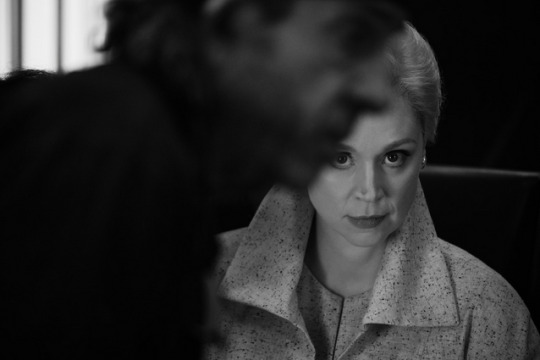
Gwendoline Christie behind the scenes of Wednesday
232 notes
·
View notes
Text

i’ve come to a very important realisation about Legend as a person
#my posts#my art#linked universe#linked universe fanart#linked universe legend#lu legend#lu fanart#every time i write him he picks some new completely random and functionally meaningless thing to have a deep-seated opinion on#does he necessarily believe what he’s saying? ehh listen it’s about the principle more than anything
534 notes
·
View notes
Text

As I await the new Nun, and motivate myself to work on Sanguis, behold this glorious meme.
#the nun#the conjuring#the conjuring universe#conjurverse#the conjuring fandom#valak#sister irene#frenchie#valak x sister irene#valak/sister irene#death and the maiden#the conjuring crack#the conjuring meme#horror fandom#Irene's like “Val pls he's done nothing to you 😑”#the problems of having a demon husband - when he hates someone he HATES someone#And Val just despises Frenchie out of principle because he's making eyes at his girl
151 notes
·
View notes
Text
i cannot stop over-analyzing asoue netflix but guys. do you think that scene in hotel denoument when the baudelaires are trying to get everyone to leave the hotel that all of the side characters' reactions represent their fatal character flaws.
like how olaf's mentors immediately started berating him and calling him a disappointment just because they believed he didn't set the hotel on fire. so their fatal character flaw was cruelty.
and mr. poe and vice principle nero refused to take their blindfolds off, despite the situation, making their fatal character flaw their incompetence, which made them the series' definition of useless adults.
babs and jerome first tried to find a way out, but ended up panicking and staying in one place, so their fatal flaw was cowardice, the original reason neither of them were able to help the baudelaires in the first place.
with esmé and carmelita, it's a little more complicated, since olaf was able to trick esmé because of both her vengefulness and greed (which manifested in her obsession with the sugar bowl), but to some degree it was also about carmelita's stubborness and entitlement (which manifested in her choosing to stay with esmé)
and, finally, justice strauss, who attempts to stop the baudelaires from running away on the roof. i've always interpreted her fatal character flaw as naivety; she believes that all problems can be solved without breaking any rules. she trusts the system too much, which is why she couldn't ever fully understand what the baudelaires were going through, and that they really did not have a choice.
overall, this scene is so important to the story, because it's the exit of all of these characters. it's the last time we see any of them. that's why these negative character traits of theirs were put in the spotlight for this scene; even though these characteristics are flaws so fatal they literally end up being the characters' dooms, they're still aspects of the characters we need to remember in order to understand why nothing went right in the lives of the baudelaires: all of these characters were too cruel or incompetent or cowardly or greedy or arrogent or naive...to be able to help them.
so, as tragic as it is, all these characters end up dying (literally or metaphorically) because of the same flaws that made them useless to the baudelaires in the first place.
#ohh boy everybody watch out frey is having asoue thoughts....again.....like always....[sigh]#in my universe none of them died and they all escaped dont ask how. if i close my eyes i can ignore the canon and all its implications <2#asoue#a series of unfortunate events#asoue netflix#hotel denoument#snicketverse#lemony snicket#justice strauss#asoue babs#jerome squalor#arthur poe#mr poe#vice principle nero#esmé squalor#carmelita spats#count olaf#fritz rambles too much
753 notes
·
View notes
Text
"Mastering Strategy: The Enduring Brilliance of Sun Tzu's 'The Art of War'"
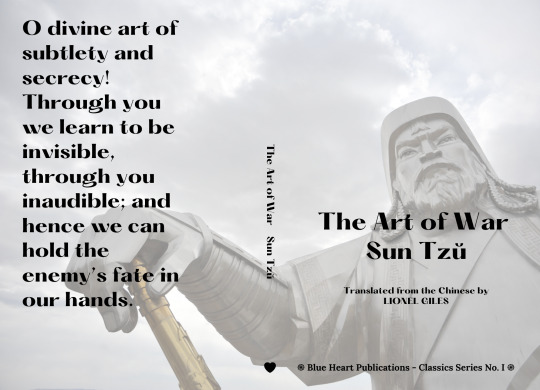
"The Art of War" by Sun Tzu stands as a timeless masterpiece in the realm of military strategy and has transcended its origins in ancient China to become a revered guide for success in various domains. Dating back to the 5th century BCE, Sun Tzu's treatise has not only influenced military tactics but has also found applications in business, leadership, and diplomacy. The title, "The Art of War," serves as an alluring invitation into the world of strategic wisdom, where Sun Tzu imparts his profound insights on warfare and the strategic mindset.
Sun Tzu's treatise comprises thirteen chapters, each a strategic gem that encapsulates the essence of successful warfare. The title echoes the overarching theme—the approach to war as an art form, requiring not only brute force but also a nuanced understanding of the psychological, logistical, and strategic dimensions of conflict. Sun Tzu's teachings are framed within the context of deception, adaptability, and the ability to understand and exploit the vulnerabilities of both enemies and oneself.
The treatise begins with the famous assertion that "All warfare is based on deception." The title, "The Art of War," encapsulates this fundamental premise, emphasizing the nuanced, strategic thinking required to achieve victory. Sun Tzu's emphasis on intelligence, reconnaissance, and the understanding of the enemy's mindset forms the foundation of his strategic philosophy. The title becomes a gateway to a world where war is not just about battles but about outthinking and outmaneuvering the opponent.
One of the enduring qualities of "The Art of War" is its adaptability to different contexts. The title serves as a beacon for leaders and strategists across diverse fields who seek to navigate the complexities of competition and conflict. Sun Tzu's teachings on the importance of knowing oneself and knowing the enemy resonate as universal principles applicable to corporate boardrooms, political negotiations, and personal development. The title becomes a mantra for those who understand that strategic thinking is not confined to the battlefield but is a crucial aspect of success in any endeavor.
Sun Tzu's strategic brilliance is evident in his emphasis on winning without fighting. The title encapsulates this paradoxical approach to war, where the ultimate triumph lies not in the bloodshed of battle but in the ability to secure victory through strategic maneuvers and psychological advantage. The treatise becomes a guide for leaders seeking to minimize conflict and maximize success through shrewd decision-making and calculated actions.
"The Art of War" is not a glorification of war but a pragmatic guide to achieving objectives efficiently and effectively. The title encapsulates the dichotomy of war as both a destructive force and a disciplined art form. Sun Tzu's emphasis on planning, adaptability, and the exploitation of opportunities resonates through the pages, making the title a symbol of strategic acumen that transcends time and cultural boundaries.
In conclusion, "The Art of War" by Sun Tzu is a masterpiece that continues to shape the understanding of strategy and warfare. The title, with its enigmatic simplicity, beckons readers into a world of strategic wisdom, where the artistry of war lies in the meticulous planning, insightful adaptation, and the ability to achieve objectives without unnecessary conflict. Sun Tzu's treatise remains a testament to the enduring relevance of strategic thinking, making the title not just an invitation to study military tactics but an exploration of the timeless principles that govern success in the art of war and beyond.
"The Art of War" by Sun Tzu is available in Amazon in paperback 10.99$ and hardcover 19.00$ editions.
Number of pages: 218
Language: English
Rating: 9/10
Link of the book!
Review By: King's Cat
#Sun Tzu#The Art of War#Military strategy#Ancient China#Strategic wisdom#Deception#Adaptability#Psychological warfare#Logistics#Sun Tzu's teachings#Know thyself#know thy enemy#Intelligence#Tactical acumen#War as an art form#Winning without fighting#Universal principles#Corporate strategy#Political negotiation#Personal development#Strategic thinking#Maneuvering#Calculated actions#Paradoxical approach#Triumph through planning#Efficient objectives#Disciplined artistry#Minimizing conflict#Maximizing success#Pragmatic guide
3 notes
·
View notes
Text
People who excessively hate on lan xichen and paint him as some kind of villain in a quest to simplify a complex, open-ended narrative are both boring and incorrect
#its not his fault if you subscribe to moral absolutism!!!#dont push that on him#isnt that just reinforing the lan methodology we all condem so much for punishing wangji so ruthlessly#for the same crime his brother commits?!?!#ie loving someone whos fundamental understanding of the universe syands against those principles???#the mistake of all lans!!!#tthe only problem being that xichen and jgy stand as narrative foils to the same struggles of their younger generation peers#in you know probably an effort to adress the intergenerational trauma of war and what not#so theyre doomrd from the jump!!!!#im just having dome feelings please be nice to my sons#cql#the untamed#jin guangyao#lan xichen#like yes his inaction led to tragedy!! much like lan wangji!!!!!!!#but we dont all get to start over via the magic of necromancy!#some of us have to be sacrificed to the purpose of the narrative!!!!!#sorry#im just feeling protective of my lil guy#is he free of crime?!?! no!!#but he should not be unilaterally condemned for failing in the same moral pilgramage lan wangji had to struggle with for 16+ years!!!#also for anyone wondering who lan qirens tragic love that bound him to someone fundamentally opposed to the world view he was raised under#its xichen and wangji#like its always been them#his failure is the failure 2 commit tonthat same kind of moral pilgrammage and willingness to fail inthe effort of keeping a so called peace#that worked only for the oppressive party#ok NOW im done probably
143 notes
·
View notes
Text
"Mastering Strategy: The Enduring Brilliance of Sun Tzu's 'The Art of War'"
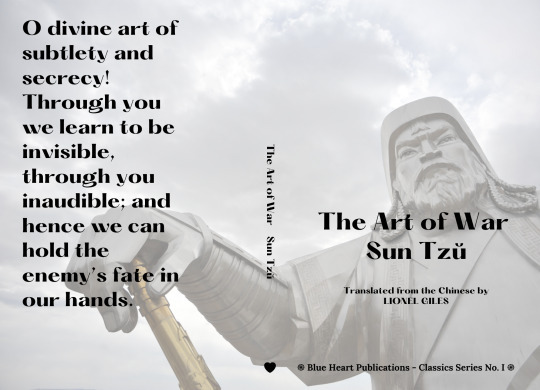
"The Art of War" by Sun Tzu stands as a timeless masterpiece in the realm of military strategy and has transcended its origins in ancient China to become a revered guide for success in various domains. Dating back to the 5th century BCE, Sun Tzu's treatise has not only influenced military tactics but has also found applications in business, leadership, and diplomacy. The title, "The Art of War," serves as an alluring invitation into the world of strategic wisdom, where Sun Tzu imparts his profound insights on warfare and the strategic mindset.
Sun Tzu's treatise comprises thirteen chapters, each a strategic gem that encapsulates the essence of successful warfare. The title echoes the overarching theme—the approach to war as an art form, requiring not only brute force but also a nuanced understanding of the psychological, logistical, and strategic dimensions of conflict. Sun Tzu's teachings are framed within the context of deception, adaptability, and the ability to understand and exploit the vulnerabilities of both enemies and oneself.
The treatise begins with the famous assertion that "All warfare is based on deception." The title, "The Art of War," encapsulates this fundamental premise, emphasizing the nuanced, strategic thinking required to achieve victory. Sun Tzu's emphasis on intelligence, reconnaissance, and the understanding of the enemy's mindset forms the foundation of his strategic philosophy. The title becomes a gateway to a world where war is not just about battles but about outthinking and outmaneuvering the opponent.
One of the enduring qualities of "The Art of War" is its adaptability to different contexts. The title serves as a beacon for leaders and strategists across diverse fields who seek to navigate the complexities of competition and conflict. Sun Tzu's teachings on the importance of knowing oneself and knowing the enemy resonate as universal principles applicable to corporate boardrooms, political negotiations, and personal development. The title becomes a mantra for those who understand that strategic thinking is not confined to the battlefield but is a crucial aspect of success in any endeavor.
Sun Tzu's strategic brilliance is evident in his emphasis on winning without fighting. The title encapsulates this paradoxical approach to war, where the ultimate triumph lies not in the bloodshed of battle but in the ability to secure victory through strategic maneuvers and psychological advantage. The treatise becomes a guide for leaders seeking to minimize conflict and maximize success through shrewd decision-making and calculated actions.
"The Art of War" is not a glorification of war but a pragmatic guide to achieving objectives efficiently and effectively. The title encapsulates the dichotomy of war as both a destructive force and a disciplined art form. Sun Tzu's emphasis on planning, adaptability, and the exploitation of opportunities resonates through the pages, making the title a symbol of strategic acumen that transcends time and cultural boundaries.
In conclusion, "The Art of War" by Sun Tzu is a masterpiece that continues to shape the understanding of strategy and warfare. The title, with its enigmatic simplicity, beckons readers into a world of strategic wisdom, where the artistry of war lies in the meticulous planning, insightful adaptation, and the ability to achieve objectives without unnecessary conflict. Sun Tzu's treatise remains a testament to the enduring relevance of strategic thinking, making the title not just an invitation to study military tactics but an exploration of the timeless principles that govern success in the art of war and beyond.
"The Art of War" by Sun Tzu is available in Amazon in paperback 10.99$ and hardcover 19.00$ editions.
Number of pages: 218
Language: English
Rating: 9/10
Link of the book!
Review By: King's Cat
#Sun Tzu#The Art of War#Military strategy#Ancient China#Strategic wisdom#Deception#Adaptability#Psychological warfare#Logistics#Sun Tzu's teachings#Know thyself#know thy enemy#Intelligence#Tactical acumen#War as an art form#Winning without fighting#Universal principles#Corporate strategy#Political negotiation#Personal development#Strategic thinking#Maneuvering#Calculated actions#Paradoxical approach#Triumph through planning#Efficient objectives#Disciplined artistry#Minimizing conflict#Maximizing success#Pragmatic guide
1 note
·
View note
Text
Y'know the thing about writing feral/unhinged versions of Orion/Optimus, is that you can't go too far into the feral/unhinged direction to a point where OP's core character traits are lost or become too diminished. After all, in a multiple-continuity franchise like TF, part of what makes the stories make sense is that even if details change (sometimes major details), the characters are still recognizably themselves to one degree or another. (Although this isn't always the case due to executive meddling or some characters being such blank slates from their initial G1 appearances that there's basically nothing to model them off of, but I digress.)
It's pretty much another reason why I love IDW1 Optimus, bc he literally is a canonical feral/unhinged Optimus who's unhinged as a direct consequence of who he is as a person and what he's been through. Like, he still has those fundamental character traits of trying his best to be moral and make good choices, trying to be a role model, etc, except after 4 million years of war and untreated depression he's basically holding onto his sense of self by his fingertips. So when he "goes feral" e.g. losing his temper and beating up/killing people or saying hurtful things, he's feral in a way that's directly tied to his normal personality and not just as a random quirk he has.
IDW OP's feral moments arise from the gaps between "Optimus' attempts to be who he thinks he needs to be" and "the reality of the world that he can't fix/seems to only make worse" that cause him to lose hope, or become cynical, or lose his temper. But in this case, the unhinged-ness makes perfect sense because it arises out of Optimus trying and failing to be the best person or to make the most morally good choices he's trying to make. Basically, the "feral/unhinged" label is just another way of me trying to say that he's not just unhinged because he's weird or because he's a bad person, but because it's an emotional reaction (more like an emotional explosion due to pent-up emotions) to the context he exists in.
I'd also say that IDW OP's personality being generally reserved/stoic and (trying to be) noble works in tandem with those moments he has of going feral because it makes him more realistic. His psyche is treated in a way where the writers are like, "Hey what if the pressure of having to be everyone's idol and be the best person in the galaxy at all times actually broke Optimus down mentally and emotionally?" It makes IDW OP far more relatable. Instead of naturally being a perfect Christ-like figure who never wavers in his morals or convictions and is just naturally a nice person who always has the wisest and best answer, being a good person is something that IDW OP has to consciously strive to be. Even when he feels like it's useless, or the cycle of violence will never stop, or any attempts he makes to help only ends up with things becoming worse.
And I feel like this does a service not only to IDW Optimus as a character, but also as a sort of moral/philosophical perspective for the reader to ponder upon? I feel like culture at large (or at least my experience of it) tends to believe that "goodness" in a person is simply an innate feature that people are born/not born with, and that being "good" means that you must be good at all times, both in your actions as well as the way you feel emotionally about yourself and the world. Like, there's a tendency for our vision of "a good person" to be good in every aspect at all times without having to try to be a good person. So I think IDW Optimus' character stands as a good example of how someone can be good at heart but still struggle to maintain those feelings of optimism and hope and justice. It's a good idea to have such a paragon of a character (in-universe and out-of-universe) be so conflicted and to even be mistaken, misguided, or make things worse because it shows that goodness is as much about "trying to behave/act in a way that is good" and not just "existing as an innately good person."
It's way more realistic for a person to want to be good, try to be good, and sometimes/often fail than it is for them to just be a good person. I enjoy the fact that IDW Optimus is both a good person at heart, but also has to strive to be a good person and live up to other people's expectations of what they see in him. I like how he wants to be a good person and change society for the better, but he also spends a good amount of time either feeling hopeless and alone or being angry at/detached from other people because of how frustrated they make him. He's realistically portrayed as someone who wants to be good and hopeful and change things for the better, but is also mentally and emotionally broken by that burden because of how impossible it is for him to Fix Everything and be the Perfect Prime/Leader/Autobot that people see him as. It's this fascinating mixture of "yes, this is who he is as a person" but also "there are things he desires to be that he could never possibly become or live up to."
This got really far off based from feral/unhinged Optimus sdklfjaslkdlfkas. The TLDR is that if people want unhinged OP, I feel like they should give IDW OP a chance because he IS unhinged but he's unhinged in a way that's a realistic/thematic representation of how being an Absolute Good is impossible. And how being a good person isn't just about Existing And You Are A Good Person, but rather goodness is a constant state of flux in which you adjust, you make mistakes, you lose your temper and feel hopeless, but then you pick yourself up and try again.

Also IDW OP really likes climbing in dangerous wilderness and jumping out of flying vehicles which I think is very feral and sexy of him to do.
#squiggposting#idw op love#idk if i adequately explained it in the body of the post. but i really do feel some kind of way about the idea of like#being a good person isn't about just being static. always being the same person. just naturally being good and nice all teh time#but rather being a good person will cause you to be CHALLENGED and being a good person calls you to ACT#and you WILL make mistakes. there's never a situation in which you're all wise and always have the right solution or are infinitely patient#but goodness is something you can CHOOSE something you can BECOME and you can still have negative emotions and CHOOSE to be good#like being a good person is a continuous process of self improvement. you aren't just born a good person#and i'm not trying to tear down the notion of 'goodness' or say it doesn't exist#rather i'm trying to say that it's far more comforting to hear that you don't have to be The Best Person at all times#it's comforting to know that good people aren't just Effortlessly Good because they were Just Born That Way Naturally#there certainly are some people like that but most of us aren't like that. and i just like idw op for that reason#he shows that like. you can be a fucked up mentally ill guy who despairs and loses his temper and is basically suicidal#but you also still genuinely try to be hopeful and try to help others. like you are good because you Try To Be Good#and you Try To Hold Onto Your Principles bc giving up or becoming evil isn't an option for you#but also trying to be A Good Person drives you fucking crazy bc we live in a universe where that perfect good simply isn't possible#so the result is an optimus who's at once Noble Paragon and Unhinged bc he's unhinged as a result of trying to be a paragon
37 notes
·
View notes
Text
The whole contains nothing which is not for its advantage; and all natures indeed have this common principle, but the nature of the universe has this principle besides, that it cannot be compelled even by any external cause to generate anything harmful to itself.
— Marcus Aurelius
#life quotes#lifequotes#light#quote#quote of the day#quoteoftheday#quotes#wisdom#marcus aurelius#whole#wholeness#monad#oneness#interbeing#natures#human nature#humanity#superorganism#common principles#universe#external causes#harmony#cosmos#universal harmony#integrated whole#benevolent universe
30 notes
·
View notes